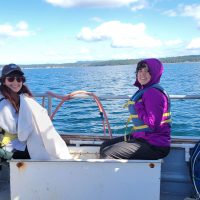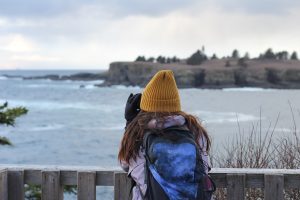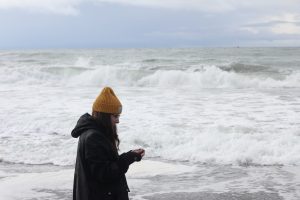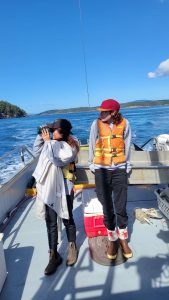Congratulations to Mollie Ball, College of the Environment Undergraduate Dean’s Medalist for 2025
Congratulations to Mollie Ball, named this year as the College of the Environment Undergraduate Dean’s Medalist. Mollie, double majoring in Marine Biology and Ecology, Evolution, and Conservation Biology at UW, has been an exceptional student, an outstanding contributor to the College and Marine Biology communities, and a leader amongst the transfer student community.
- Mollie at Cape Flattery, the northernmost point of the contiguous US, during the GEODUC 2023-24 cohort field trip to the Olympic Natural Resources Center.
- Mollie during the GEODUC 2023-24 cohort field trip to the Olympic Natural Resources Center.
“To be named the College of Environment Undergraduate Dean’s Medalist means more than I know how to convey. Joining the College of the Environment was pivotal for me as a first-generation student. When I arrived at the University, I struggled with feeling like I belonged here. I felt there was so much hidden curriculum that I didn’t have the book for! However, between the experiences I was afforded, such as working in labs and studying at Friday Harbor Labs (FHL), the mentors I had, such as Dr. Amy Van Cise and the GEODUC team, the opportunities for me to mentor others, and the events I attended and participated in, such as the SAFS Open House, taught me so much of that hidden curriculum and made me feel like I was a real part of this community,” Mollie said.
- Mollie Ball (l) and Lula Schwyhart (r) aboard the R/V Kittiwake while at FHL. “Lula is my best friend, a fellow GEODUC, and was my fellow ‘Instruction and Classroom Support Technician 1’ for the 2023-24 GEODUC cohort.”
- Mollie (l) and Elizabeth Pawelka (r) aboard the R/V Rachel Carson, taking water samples from a CTD cast during the DINOSIP internship.
- Mollie (l), Christine, Lula, and Anisa, all part of the GEODUC 2022-23 cohort, watching juvenile bald eagles at the mouth of the Elwha River.
Described by her instructors as engaged, dedicated, and a sophisticated critical thinker, a testament to her exceptional record of academic achievement and undergraduate research includes being awarded scholarships from the National Science Foundation Geo-Futures program, the GEODUC program, and an internship from the Diverse and Inclusive Naval Oceanographic Summer Program (DINOSIP).

“After engaging in all of the opportunities at UW that built my sense of community, I felt like I belonged, and was therefore able to put myself out there and gain so many new experiences that I didn’t know existed. My identity as a scientist was cultivated here at the College of the Environment,” Mollie shared. “Receiving this award reflects all that hard work, all of those times I made myself do it, even when I was uncomfortable, all those times I kept reaching further and further. It also bolsters me to continue reaching my hand out to others who, like me, may feel out of place but who certainly belong!”
Throughout her time at UW, Mollie’s participation in undergraduate research has been extensive and varied and has become particularly strong in advanced data analyses and application of next-generation molecular tools. She has worked at the Burke Museum to study the relationship between bat echolocation and visual acuity and applied phylogenetic methodology to understand evolution of skull morphology. While working in the Applied Physics Lab, Mollie monitored bat activity using passive acoustic tags and analyzed the results using advanced statistical approaches. She is currently working in the Whale and Dolphin Ecology (WADE) lab, where she is using advanced analytical approaches to study diurnal activities of bottlenose dolphins, assisting with the collection of biological materials from Orcas, and examining the diet of Arctic marine mammals using molecular genetic approaches. She also received the NDiSTEM Outstanding Undergraduate Student Poster Presentation at the SACNAS conference in 2024.

As a transfer student involved in the GEODUC program, she gave back to this same community by peer mentoring 18 transfer students at FHL, leading team-building activities, demonstrating an advanced aptitude for pedagogy, and has made the program substantially richer as a result of her involvement.
After graduating— which Mollie will do very soon in June this year—she will be returning to the University of Washington in the fall to pursue a Masters of Science at the School of Aquatic and Fishery Sciences (SAFS), working with Dr. Amy Van Cise to understand more about how diet composition influences the gut microbiome of marine mammals.
Congratulations Mollie—we’re excited to see what the future holds for you!
- Mollie (l) and Sophia Kaiaua (r), interviewing Dr. Michael Weiss (center), Research Director for the Center for Whale Research, on the Deck at FHL for an outreach video on why studying Southern Resident killer whale diet can help conserve the population.
- Mollie and two COASST interns – they are teaching her how to conduct a COASST survey on the Olympic Coast.






